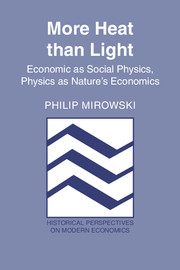Book contents
- Frontmatter
- Contents
- Figures
- Acknowledgments
- 1 The fearful spheres of Pascal and Parmenides
- 2 Everything an economist needs to know about physics but was probably afraid to ask: The history of the energy concept
- 3 Body, motion, and value
- 4 Science and substance theories of value in political economy to 1870
- 5 Neoclassical economic theory: An irresistable field of force meets an immovable object
- 6 The corruption of the field metaphor, and the retrogression to substance theories of value: Neoclassical production theory
- 7 The ironies of physics envy
- 8 Universal history is the story of different intonations given to a handful of metaphors
- Appendix: The mathematics of the Lagrangian and Hamiltonian formalisms
- Notes
- Bibliography
- Index
8 - Universal history is the story of different intonations given to a handful of metaphors
Published online by Cambridge University Press: 01 June 2011
- Frontmatter
- Contents
- Figures
- Acknowledgments
- 1 The fearful spheres of Pascal and Parmenides
- 2 Everything an economist needs to know about physics but was probably afraid to ask: The history of the energy concept
- 3 Body, motion, and value
- 4 Science and substance theories of value in political economy to 1870
- 5 Neoclassical economic theory: An irresistable field of force meets an immovable object
- 6 The corruption of the field metaphor, and the retrogression to substance theories of value: Neoclassical production theory
- 7 The ironies of physics envy
- 8 Universal history is the story of different intonations given to a handful of metaphors
- Appendix: The mathematics of the Lagrangian and Hamiltonian formalisms
- Notes
- Bibliography
- Index
Summary
Energy is the only life and is from the Body
And Reason is the bound or outward circumference of Energy,
Energy is Eternal Delight.
William Blake, “The Marriage of Heaven and Hell”As for himself, according to Helmholtz, Ernst Mach, and Arthur Balfour, he was henceforth to be a conscious ball of vibrating motions, traversed in every direction by infinite lines of rotation of vibration, rolling at the feet of the Virgin of Chartres or of M. Poincaré in an attic in Paris, a centre of supersensual chaos.
Henry Adams, The Education of Henry AdamsWhenever I have lectured on the material found in the previous pages, or on the occasions when I have had sympathetic readers of this manuscript seek to discuss its contents, the first reaction is invariably: But do you really mean to say that physics is the dog and economics is the tail throughout the whole of the history of economic thought? The short, sharp, wicked answer would be “yes,” but that answer would not be worthy of an historian. Clearly, many concepts in the history of economic thought have been prompted by any number of other intellectual concerns; entire schools of economic thought have denounced and resisted the siren song of a social physics: the German Historicist school for one, and the first two generations of the American Institutionalists for another (Mirowski 1988a).
Information
- Type
- Chapter
- Information
- More Heat than LightEconomics as Social Physics, Physics as Nature's Economics, pp. 396 - 401Publisher: Cambridge University PressPrint publication year: 1989
